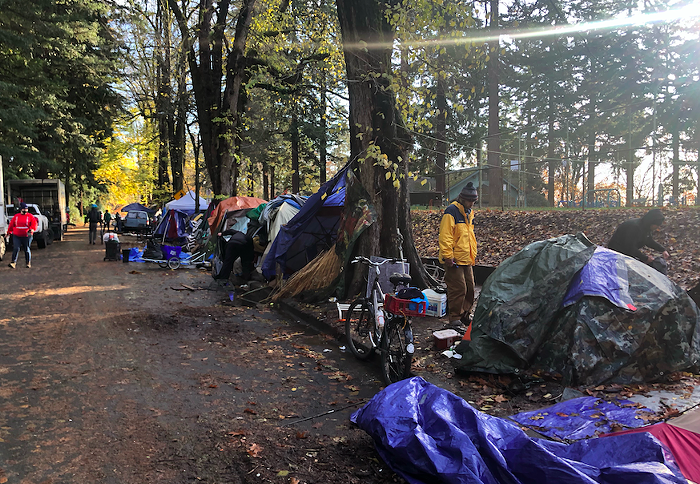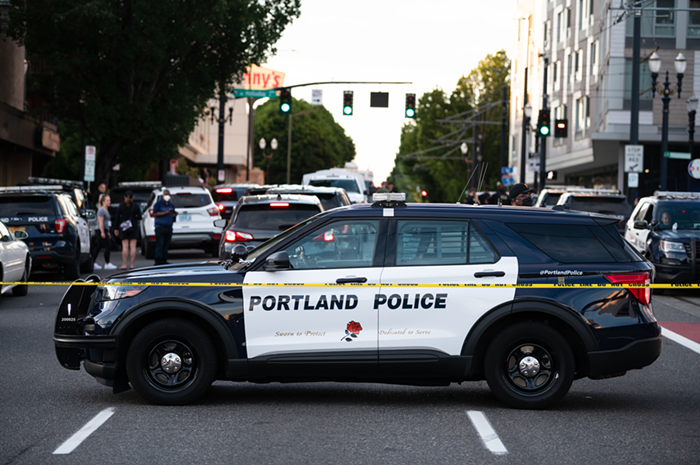
Portland is preparing for another heatwave this week with temperatures reaching the upper 90s on Thursday through Saturday. While Multnomah County is still in the process of evaluating what their agencies could have done differently to better respond to the historic heatwave in June that killed at least 54 people in the county and 83 people statewide, some of their early findings will be applied to this week's heatwave.
According to Multnomah County spokespeople, the county is addressing the coming temperature spike by improving collaboration and communication with the city and by increasing the number of phone calls it makes to county residents alerting them of the heatwave. Anyone with a county landline, mobile numbers associated with a utility bill, and people signed up for the county’s Public Alert system will receive a call today announcing that the National Weather Service has declared a heat warning from Thursday through Saturday. The automated message warns about the risks of the heat and encourages residents to call 2-1-1, the county’s information hotline, for more information and cooling center locations. Hundreds of thousands of county residents will receive the calls, according to a county spokesperson.
The county's not the only agency preparing for the hot temperatures.
Mayor Ted Wheeler launched a "heatwave task force" last week that will work on improving the city’s extreme heat response, according to a Portland Bureau of Emergency Management spokesperson. For this week’s heatwave, the city will be opening three cooling centers where the public can cool off with air conditioning and water. Only county-owned cooling centers were available during the last heatwave.
The three cooling centers are located at the Portland Building downtown, the Matt Dishman Community Center in the Elliot neighborhood, and the Charles Jordan Community Center in the Portsmouth neighborhood. All three locations will be open Thursday and Friday from noon to 9 pm.
There will also be outdoor misting centers at Glenhaven Park, Mt. Scott Park, and Knott Park, and all library branches are now open for the public. Masks are required in the library and other county buildings. A complete list of all cooling center options is posted on the county’s website.
Otherwise, regional heat responses will be similar to the last heatwave.
The Joint Office of Homeless Services (JOHS) plan to mobilize outreach teams to deliver water and other cooling supplies to unhoused Portlanders. During the last heatwave, those teams and other partners distributed over 66,000 water bottles throughout the city. Anyone can make an appointment at the JOHS distribution center at SW 5th and Washington to pick up water and personal protective equipment. The distribution center will be open 9 am to 4 pm Thursday through Saturday for supply pick-ups.
The county is expected to release an After Action Report—a complete review and evaluation of the county and region’s response to the historic heatwave—in August. These reports typically take a year or more to complete, but the report on the June heatwave response has been expedited because more heatwaves are expected throughout the summer. Along with the After Action Report, Multnomah County will also release a report closer to the end of the year that details long-term solutions to address extreme heatwaves in the region.
The state’s Office of Emergency Management (OEM) released its own After Action Report on Wednesday which included 16 recommendations on how the state can better prepare for extreme heat.
The 16 recommendations are split into immediate and long term improvements. Some of the immediate improvement recommendations include increasing staffing at the 2-1-1 information hotline during extreme weather events, using Emergency Medical Services to transport people to non-emergency locations like cooling centers, leveraging volunteer networks like Neighborhood Emergency Teams to conduct welfare checks in their communities, and eliminating fares for public transit during extreme heat so people can access cooling centers easily and use public transit as temporary places to cool down as well.
The recommendations from OEM seek to address two major issues Multnomah County experienced during the June heatwave. First, the city's 2-1-1 information hotline did not include a 24/7 hotline for cooling center information, leaving over 100 calls unanswered during the hottest part of the heatwave. Additionally, the county announced TriMet would not be requiring fare during the heatwave, but TriMet released a statement a day later on Twitter stating fare collection was proceeding as normal through the extreme heat. The transit agency reversed that decision a day later.
The OEM report also recommends developing better systems for identifying people in need of assistance during a heatwave. While it’s obvious what households need assistance during a flood or a fire, it’s difficult to determine what homes need assistance during a heatwave without visiting each residence one-by-one. The report suggests recruiting private sector medical providers and social services to help create a solution to the identification problem.
OEM will also study the possibility of placing free or low-cost cooling systems in homes of at-risk people and review land use and building codes to require more green spaces that would help cool down neighborhoods.
Update 7/29 2:30 pm:
Governor Kate Brown issued an emergency declaration in 23 counties, including Multnomah and Clackamas County, due to this weekend's forecasted heat. The declaration authorizes the Office of Emergency Management to coordinate the use of supplies and personnel across the state, removes barriers to mobilizing emergency resources, and bars businesses from over-pricing bottled water and other cooling supplies.
The emergency declaration ends on August 5.



















